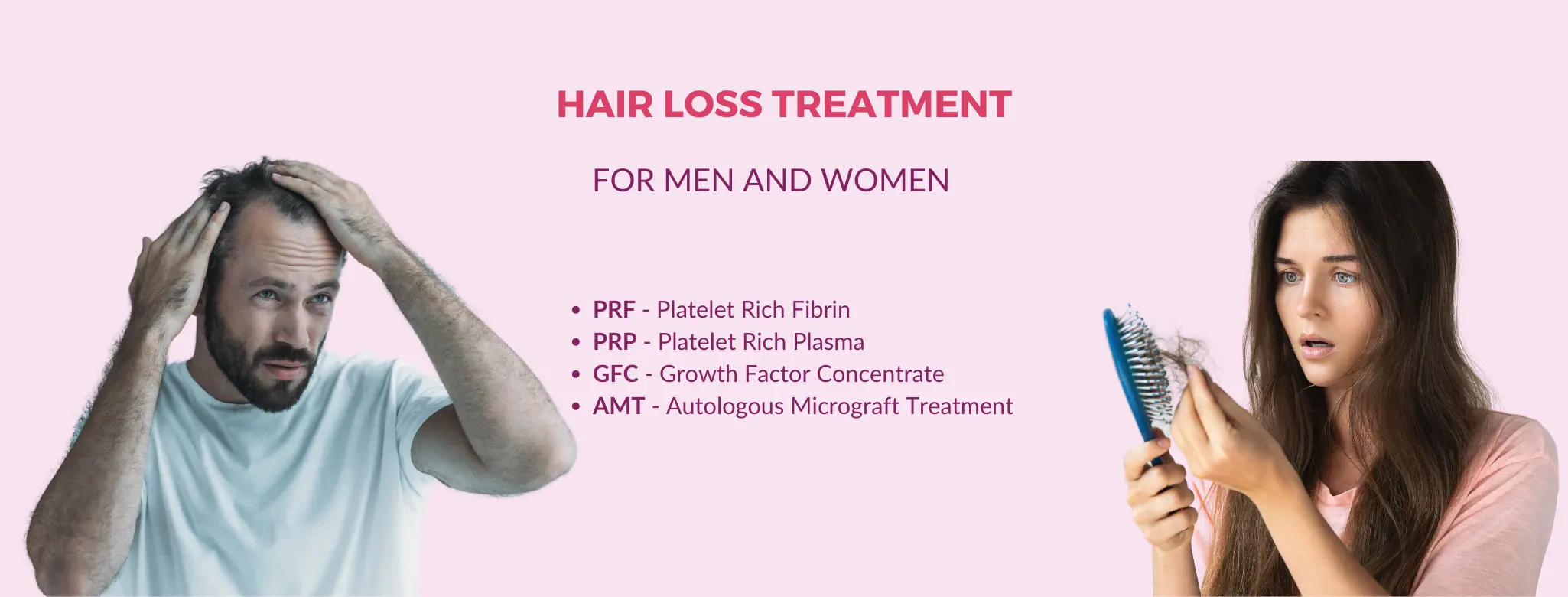
Best Hair Loss Treatment in Delhi
Identifying hair loss is so complex that we almost visit a Hair Loss Specialist either too early or too late! Here is the way you can identify if you actually have hair loss.
Everyone loses hair in routine daily life—individual losses up to 100 hair strands per day. If you have hair fall over 100 strands per day or are seeing some bald patches, severe thinning, and decreasing hair density, you may be experiencing hair loss!
It is for all to understand that Hair loss not only causes a physical change in the appearance of a person, but this, in turn, leads to great psychological distress, which can affect an individual both personally and professionally. Losing hair could be like losing crowning glory.
Therefore, it is important to recognize hair loss early and consult with the hair specialist. The psychological distress is the same in both males and females. Having good hair gives not only a more appealing personality but also boosts one's confidence and self-esteem.
When getting the Best Hair Loss Treatment in Delhi, one must understand that prevention is better than cure! Hair Loss is a chronic process, and so is its treatment which is to be maintained regularly. The only permanent solution to hair loss is Hair Transplant which is required only if an individual develops permanent baldness.
This is why it's important to prevent hair loss at an early stage using medical advice from a certified hair specialist. If you are looking for the Best Hair Fall Treatment in Delhi, visit Skinos, the Only Clinic in Delhi with 100% client satisfaction.
What causes hair loss?
The reasons for hair loss are many, and rightly so, there are many types of hair loss.
A sudden severe hair loss may be due to medical illnesses like high fever or severe infection, crash dieting, certain medications, and childbirth. If you are experiencing a slow and gradual hair loss, which is becoming worse and more noticeable with each passing year, you are most likely suffering from hereditary hair loss called androgenetic alopecia. Few incorrect hair care practices may also cause significant loss of hair.
What is androgenetic alopecia?
Androgenic alopecia, also known as hereditary hair loss, is one of the common forms of hair loss affecting both men and women. Male pattern baldness presents as receding hairline, thinning of hair, increased scalp visibility, and sometimes even as a round bald patch on the top of the scalp, along with a family history of hair loss. It is the most common type of hair loss in men.
On the other side, female pattern baldness has more prominent hair thinning seen as widening of the central parting in the balding area. The hairline is, however, intact. Completely bald patches are also rare in women.
What is alopecia areata?
Alopecia Areata is an autoimmune condition. Autoimmune means the body’s own immune system (white blood cells) attacks the body’s other cells. In this case, the immune cells attack their own hair follicles leading to hair loss in patches that are coined shaped bald spots.
It is seen as smooth, round patches of hair loss on the scalp. The number of patchy hair loss may be single or multiple. The bald patches most commonly occur on the scalp but may also affect other hair-bearing areas of the body, like the beard and mustache in males, or even eyebrows and eyelashes.
In rare cases, it can cause complete hair loss in otherwise healthy people, known as alopecia totalis or Alopecia Universalis. SKINOS is the best clinic for Alopecia Areata Treatment.
What is scarring alopecia?
Scarring (cicatricial) alopecia is a skin condition where the hair follicles are destroyed completely and permanently; scar tissue forms in the area where the follicles were once present. The hair can not grow back if scarring alopecia occurs.
It usually occurs following some inflammatory diseases of the scalp like fungal infection, DLE, SLE, LPP.
Treatment for scarring alopecia aims to inhibit the inflammation, which is responsible for the permanent destruction of hair follicles.
What is telogen effluvium?
Telogen effluvium is a condition in which the balance between the various stages of the hair growth cycle is disturbed. Most hair goes into the falling phase (telogen phase), which clinically manifests as sudden severe diffuse hair loss. People can experience hair loss of more than 300-400 hair strands in a day, and it is really a very alarming situation!
Telogen effluvium occurs most commonly because of nutritional deficiencies in the body, especially iron and other vitamins. It can also occur due to hormonal imbalances like PCOS (unwanted hair growth) and thyroid hormone dysfunction. Other reasons for hair loss are medical illness, high fever, severe infection, long hospital stay, surgery, accident, childbirth, sudden severe weight loss, or emotional stress.
The good news is telogen effluvium is a reversible condition! Whatever hair you lose tends to grow back within 6 months restoring the lost hair in the growth phase.
What is trichotillomania?
It is a psychiatric disorder that can give rise to a form of hair loss called Trichotillomania. It is a medical condition in which the person has an irresistible urge to pull out their own hair shaft, and after pulling out their hair, they get a great sense of satisfaction and gratification.
The common areas affected in this condition are the ones that are easily accessible for hair removing like the sides of the scalp, eyebrows, eyelashes, and even the nose and body hair from easily accessible areas. There are signs of hair breakage in the affected area.
Can hair loss occur because of some medicines as well?
Yes. Some medications can precipitate hair fall due to their side effects. These include blood thinners, high dose vitamin A, medicines that treat arthritis, depression, gout, heart problems, and high blood pressure.
What are the hair care practices that can damage the hair and cause hair loss?
The hair accessories and hairstyle you wear and some of the products you use can cause hair loss in the long term. The other common causes of hair loss include:
Hair bleach
Hair fixers
Rubbing, brushing or combing wet hair
Frequent blow dryers, irons and curlers
Excessive shampooing, combing and brushing
Too many hair clips, hair pins and tight rubber bands
Tight hair styles like braids, ponytails (cause traction alopecia)
What is the treatment of hair loss?
The hair loss treatment options depend on the reason for hair loss. So before treating hair loss, it is essential to consult an experienced dermatologist to get a proper diagnosis and start the treatment. At Skinos, the Best Hair Loss Treatment Clinic in Delhi, we follow all hair loss treatment protocols according to the American Academy of Dermatology Guidelines. The treatments offered are FDA Approved.
One should be prompt and proactive in taking anti-hair fall treatment, as the sooner the treatment is started, the higher are the chances to restore a good hair volume.
Following are the different treatment modalities. Usually, a combination of different treatments gives the best results. Also, good hair and scalp hygiene practices like washing your hair as recommended are important in treating hair loss.
Oral Medications : Hair loss vitamins and nutrients increase hair regrowth, and other medications are used to block the hormone formation responsible for causing hair loss. This adds to the stoppage of androgenic alopecia and results in restoring and retaining the existing volume of hair.
Topical Scalp Lotion: Topical lotions like minoxidil rogaine prevent hair loss, regrow hair, and increase hair thickness and volume through increased blood circulation on the scalp.
Mesotherapy : It employs multiple injections of pharmaceutical medications, growth factors, vitamins, and other ingredients into the scalp, which enhances the metabolism of the cell and speeds up the growth of existing hair follicles, and promotes new hair growth.
Dermaroller : Dermaroller is a procedure done with the help of a drum-shaped instrument, having fine needles attached to it, which is rolled on the scalp to create micro-injuries. This leads to the release of growth factors which in turn facilitates the growth of new hair follicles.
Corticosteroid : It is most commonly used in Alopecia Areata Treatment
Laser Hair devices : Laser and light devices based on LLLT have been shown to stimulate hair growth. These are available as caps/helmets/ combs. Skinos offers Best Hair Regrowth Treatment in Delhi, where laser devices are combined with medical treatment to provide the best hair treatment results.
PRP therapy : PRP therapy: A study showed positive results in the treatment of male pattern baldness. PRP is one of the most important adjuvants in the treatment of hair fall. It promotes the growth of new hair follicles and increases the thickness and volume of hair. Additional information about PRP is that it is also used as an anti-aging treatment to improve fine lines and wrinkles on the face.
SCT: SCT Therapy: In this, small micrografts are taken from the back of the scalp. Those grafts are processed in a machine to create a liquified form of the substance, which is injected into the affected area of the scalp.
Usually, one session is enough for a year. It's an adjuvant therapy of hair loss management. One usually starts to see great results in 3 months.
Hair Transplant : Hair transplantation is a process in which healthy hair follicles transfer from the occipital area (donor area) to the scalp's frontal area (recipient area). It is advised for patients with a higher grade of hair loss due to androgenetic alopecia in males and females. After getting a hair transplant surgery, it takes 9-12 months to grow and see the final results.
What is the hair loss treatment for women?
Hair loss treatments for females are dependent on the type of hair loss, just like the treatment of hair loss for males. Skinos offers hair loss treatment in both males and females with consistent, assured results.
What dietary supplements can help with my hair loss problem?
Home remedies for hair loss: A well-balanced diet per age and body weight containing all the nutrients is essential to have healthy hair and plays an important role in hair structural integrity and hair health.
Amino acids and Proteins form the structure of the hair and hair production. A high protein diet will stop hair loss and maintain the hair structure. Some of the rich sources of proteins are meats, eggs, fish, nuts, seeds, wheat germ, and beans. Fish oil is rich in essential fatty acids and helps maintain the cellular metabolism in the body, improves hair circulation in the scalp, and prevents hair follicle inflammation.
It is essential to maintain optimum blood serum levels of vitamin d level, vitamin b12, biotin vitamin, and other vitamins and minerals.
Vitamin C derived from citrus fruits prevents oxidative stress and damage from free radicals.
Iron is again essential for hair growth. Iron deficiency is one of the most common reasons for diffuse hair fall in men and women, usually diagnosed through a blood test. Iron-rich foods include iron-fortified cereals, soybeans, pumpkin seeds, white beans, lentils, leafy greens, spinach, clams, and oysters. Iron in Red blood cells carries oxygen to the different organs of the body and hence to the skin and hair, which is the body's largest organ.
Squeeze out the juice from an onion and apply it at the site of the alopecia areata patch. This acts as an irritant and helps in hair regrowth. Onion juice is tried by almost everyone facing alopecia areata at some point as a home remedy.
Green Tea consumption decreases DHT, the male hormone, which is the reason for hair loss, and hence it is effective in preventing hair loss.
Coconut Oil and Olive Oil are considered good for providing nourishment to hair. Regular oiling adds natural moisture and conditioning to your hair.
Aloe vera contains vitamins A, C, E, B12, and folic acid. They promote cell turnover and healthy cell growth. Thus, it prevents hair fall and leads to shiny hair.
Fenugreek seeds paste applied on the scalp promotes hair thickness and growth. Wondering How? We now all know that DHT is responsible for hair thinning in androgenetic alopecia. Fenugreek decreases the attachment of DHT to hair follicles and reduces hair fall.
In case you have some specific nutritional deficiencies, you should seek help from a qualified dermatologist and cosmetologist to take the necessary supplements to fulfill the deficiencies. Nutritional deficiencies are common in female pattern hair loss.
Can Dandruff Cause Hair Loss?
Dandruff is also known as seborrhoeic dermatitis, is associated with inflammation of the scalp and hair follicles. This leads to an itchy scalp and causes hair fall. Moreso in monsoons, high atmospheric humidity increases oil production from the scalp and worsens the dandruff problem. This is another reason why hair fall commonly worsens during the monsoon weather.
Dont's in Dandruff:
- • Oil massage is definitely a no for people facing dandruff issues.
- • Using hot water to rinse your hair during winters causes dry scalp, increasing sebum production, thus worsening dandruff.
Treatment of Dandruff:
- • Scalp peeling: Scalp peel is a solution containing glycolic acid and salicylic acid, which help to remove excess sebum from the scalp and helps maintain good scalp hygiene.
- • Medi Hair Spa: Medi Hair Spa, in addition to providing the benefits of calp peel, medi hair spa also helps in improving the hair texture, volume and gives the hair a shiny, smooth, and silky look.
Who is the Best Hair Loss Treatment Doctor in Delhi?
Choosing the right hair and skin clinic and the best hair loss doctor near me is as important as getting the right hair loss treatment. Always make sure you choose a board-certified dermatologist and trichologist for hair loss consultation and treatment.
Hair loss treatment cost in Delhi will depend on the type of hair loss, and the types of treatment required medically. However, in the case of the most common type of hair loss, androgenic alopecia, in which PRP is recommended, would cost on an average of Rs.10000 to Rs.15000 per session.
Why is there hair loss after covid?
hair loss due to covid vaccine
Post-Covid Hair-fall
A sudden rise of 8% has been noticed on google searches for hair loss solutions in the last 12 months. Doctors have noticed an escalation in the number of patients who are facing hair fall after covid-19. So, basically, hair fall starts either after recovery from Covid-19 or 6-8 weeks after the person is tested positive. In several cases, an extensive amount of hair loss has been noticed.
Causes of post covid hair loss:
There are many reasons which are adding up to the problem like -
1. Stress - The world is going through a global pandemic, and no wonder the stress among people is rising at an alarming rate. The people affected by Covid-19 are facing issues like hair fall, but the remaining people are also stressed due to the havoc of Covid-19.
2. Nutritional deficiency- Hair fall mainly occurs due to the deficiency of vital nutritions like Vit-D, B12, iron, and zinc. Taking proper nutrition is very important as the body is already under the recovery phase after covid-19.
3. Intake of certain medications can also hamper hair growth as some hormonal changes occur due to the medications.
4. Inflammatory reactions caused by Covid-19- The majority of the population faces hair loss issues after 2-3 months of recovery from Covid-19, in which hair moves into the dormant stage and results in hair loss. This may last for 5-6 months, but your hair will start growing normally after that.
So, now you can breathe a sigh of relief as we have good news that the hair falls on your face are not permanent. It will eventually start getting better after 3-4 months.
This condition is known as Telogen Effluvium, which causes a sudden surge of hair fall. In this condition, the follicles move to the Telogen stage (i.e., resting phase) way before the time.
What is Telogen Effluvium?
Every hair follicle grows into a cyclic pattern which consists of four stages, i.e., Anagen stage, catagen stage, and exogen stage.
Sometimes due to certain conditions like hormonal imbalance, stress, prolonged disease, our hair tends to enter into the telogen stage (Resting Phase) way before the time, which results in excessive hair fall. This condition is known as Telogen Effluvium.
Causes of Telogen Effluvium
As the whole world is under the havoc of Covid-19, everyone is going through mental stress. Telogen Effluvium is caused by stress. Hormonal imbalance, pregnancy, due to intake of certain medications or due to some underlying health issues.
People infected face hair fall generally after the recovery or after 6-8 weeks after the person is affected. This is because the body is going through several changes and stress. Even the people who aren’t affected are under stress from the pandemic, which might be one of the causes of hair loss.
As mentioned above, your hair will grow back after 2-3 months because after the shedding phase, your hair will again go into the anagen stage, and new hair strands will start growing. So if you see those tiny baby hair, that’s definitely a good sign. Hair is biologically not connective tissue; therefore, whenever the body is under stress or mental trauma, it focuses more on the other body functions and not on the hair growth resulting in hair fall.
How to avoid stress and stop hair loss due to Covid-19?
The most crucial step is to diagnose the root cause of hair loss. It is essential to seek medical guidance from a professional dermatologist. The doctor will probably advise a blood test and then state the underlying reasons, whether it’s due to stress, nutritional deficiency, hormonal imbalance, or Covid-19.
- • Manage your stress and anxiety -The majority of cases that have been reported are suffering from post covid hair loss, i.e., Telogen Effluvium. But the good news is that Telogen Effluvium is a self-limiting disease that can resolve without treatment. So, your hair will start getting better after 2-3 months post-recovery. But it’s essential to visit the doctor and confirm the exact cause—practice yoga or meditation to calm your mind.
- • Keep a check on your diet- It is essential to have a balanced diet for your hair growth and overall well-being. Intake food is rich in Vit-A, Vit- B, zinc, iron, and mineral.
- • Fix your sleep cycle - This is somewhat related to stress as well as people find it difficult to sleep due to stress and because of lifestyle habits like binge-watching or scrolling through the gram. So, for your sleep cycle, try to sleep and wake up at the same time every day.
- • Don’t forget your supplements - Sometimes, the food we eat lacks some nutrients, which are crucial for the functioning of our body. Whenever our body goes through steps or recovery, it focuses more on the vital functions and organs of the body and not on the hair. So, it becomes important to intake supplements that are good for hair growth like biotin, Vit-A, Vit-B, zinc, iron. For better understanding, you can consult a doctor.
- • Hair loss treatment - It is considered normal if around 100 hair strands are falling daily, but if you are facing an extensive or massive amount of hair fall, you must consult a doctor for the concerned treatment. There are many OTC medications available in the market, like Minoxidil, to promote hair growth. The doctor also performs PRP treatments, which work wonderfully for hair growth.
Conclusion
It is normal to experience slight hair fall. It’s most probably because of the after-effects of Covid-19. It will get better eventually.
But if you're facing massive hair loss, it’s essential to seek medical guidance in the early stages of hair fall to prevent it from reaching the severe stage. You can visit Skinos hair and skin clinic and book your consultation for the right advice and treatment.
Why There Is Seasonal Hair Loss in Monsoon?
In the rainy season, the hair strands absorb excessive moisture, leading to brittle and frizzy hair because of high humidity. This causes increased hair breakage and hair fall.
Always use mild shampoo and conditioner during monsoon. Shampoo your hair twice a week.
But In case if you get wet in the rain, you must wash your hair and dry the hair naturally. Avoid using hair dryers as they can worsen the brittleness of the hair strands.
Disclaimer of the content: This content aims to create awareness of hair loss and its available treatment options. It should not be taken as a substitute for medical advice. One must always consult a qualified hair specialist to diagnose the type of hair loss and its management accurately.
What Our Patients Say
Nothing gives us more pleasure than the happiness and gratitude expressed by our clients at the end of their Skin, Hair, and Laser treatment!

I recommend Dr. Shruti Gupta because she explains everything related to my problems patiently and p...
Divya Sonkar
Studentaaa
First of all I would like to thank Dr Shruti Gupta Mam for giving me a new life. On the advice of my...
Dinesh
DU Student
Dr.Shruti is very humble and adorable to everyone she explains everything wonderfully, and answers a...
Mukta Rathee
MBBS Student
It was a pleasant experience. Your work is par above my expectations. My exuberant hair growth gives...
Mohit Shukla
DJ
I have acne issue from last 13 year's I tried all from the to homemade solution but nothing's work a...
Sonal Wahi
SQ - CA25000 +
Happy Clients
5
Qualified Doctors
9
Luxury Suites
50 +
Authorized Partners

